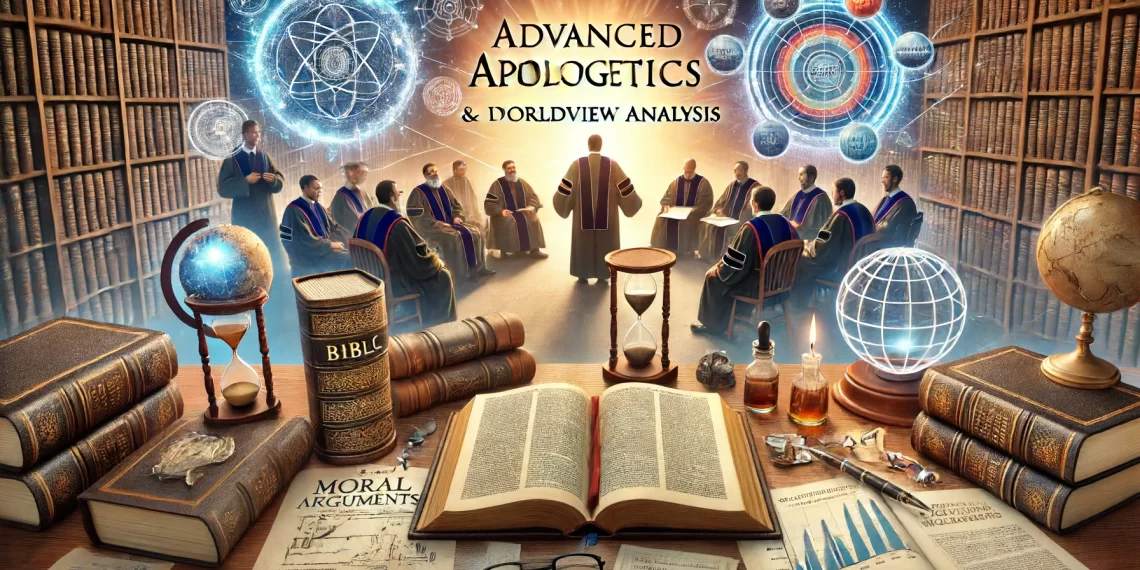Views: 1
Title: APO 801: Advanced Apologetics and Worldview Analysis
Subtitle: Defending the Faith in a Complex World
Course Name & Level: Advanced Apologetics and Worldview Analysis, Doctorate Degree
Number of Credit Hours: 3 credit hours
Keywords: Apologetics, Worldview, Christian Theology
1. Introduction:
This course delves into advanced principles of apologetics and the analysis of various worldviews. Students will explore how to defend the Christian faith against contemporary challenges.
2. Course Description:
An advanced examination of apologetic methods and strategies for analyzing and responding to diverse worldviews. The course includes philosophical, historical, and theological perspectives, emphasizing practical application.
3. Course Purpose:
To equip students with the knowledge and skills to effectively defend the Christian faith and critically engage with various worldviews.
4. Course Objectives:
To develop a comprehensive understanding of advanced apologetic methods and apply them to contemporary worldview challenges.
5. Key Terms Defined & Key Concepts Explained:
- Apologetics: The religious discipline of defending or proving the truth of religious doctrines.
- Worldview: A particular philosophy of life or conception of the world.
- Christian Theology: The study of Christian belief and practice.
- Classical Apologetics: A method of apologetics that emphasizes rational arguments for the existence of God and the truth of Christianity.
- Presuppositional Apologetics: An approach that argues one must presuppose the truth of Christianity to make sense of the world.
- Evidential Apologetics: A method that emphasizes empirical evidence to support the truth claims of Christianity.
- Moral Argument: An argument for the existence of God based on the existence of objective moral values.
- Ontological Argument: An argument for the existence of God based on the concept of being or existence.
6. Specific Topics with Descriptions:
- Introduction to Apologetic Methods: Overview of various apologetic methods and their historical development.
- Classical Apologetics: Study of classical arguments for the existence of God, such as the cosmological and teleological arguments.
- Presuppositional Apologetics: Examination of the presuppositional method and its application in defending the Christian faith.
- Evidential Apologetics: Analysis of evidential arguments, including historical and empirical evidence for Christianity.
- Worldview Analysis: Methods for analyzing and critiquing different worldviews, including secularism, atheism, and other religions.
- Philosophical Challenges: Addressing philosophical challenges to the Christian faith, such as the problem of evil and the challenge of religious pluralism.
- Historical Apologetics: Exploration of the historical reliability of the Bible and the evidence for the resurrection of Jesus.
- Cultural Apologetics: Engaging with contemporary cultural issues and the role of apologetics in the public square.
- Scientific Apologetics: The relationship between science and faith, and arguments for the compatibility of Christianity and scientific inquiry.
- Moral Apologetics: Arguments for the existence of objective moral values and duties based on the existence of God.
- Practical Apologetics: Strategies for effectively communicating and defending the Christian faith in various contexts.
- Case Studies in Apologetics: Application of apologetic principles to real-world scenarios and challenges.
7. Assessments with Descriptions:
- Quizzes: Regular quizzes to assess understanding of key concepts and theories.
- Reflection Papers: Written reflections on apologetic arguments and personal responses.
- Case Study Analysis: In-depth analysis of case studies applying apologetic principles.
- Research Proposal: Development of a research proposal on a contemporary apologetic issue.
- Literature Review: Comprehensive review of scholarly literature on a selected apologetic topic.
- Research Paper: An in-depth research paper exploring a specific apologetic issue in detail.
- Midterm Exam: An exam covering the first half of the course material.
- Final Exam: Comprehensive exam covering the entire course.
- Participation: Active participation in seminar discussions and group activities.
- Presentation: A presentation on a significant apologetic issue and its implications for Christian faith and practice.
8. Research References:
- Mere Christianity by C.S. Lewis. eBook format. MLA Citation: Lewis, C.S. Mere Christianity. HarperOne, 2001.
- Reasonable Faith: Christian Truth and Apologetics by William Lane Craig. eBook format. MLA Citation: Craig, William Lane. Reasonable Faith: Christian Truth and Apologetics. Crossway, 2008.
- The Case for Christ by Lee Strobel. eBook format. MLA Citation: Strobel, Lee. The Case for Christ. Zondervan, 1998.
- The Reason for God: Belief in an Age of Skepticism by Timothy Keller. eBook format. MLA Citation: Keller, Timothy. The Reason for God: Belief in an Age of Skepticism. Dutton, 2008.
- Christian Apologetics: A Comprehensive Case for Biblical Faith by Douglas Groothuis. eBook format. MLA Citation: Groothuis, Douglas. Christian Apologetics: A Comprehensive Case for Biblical Faith. IVP Academic, 2011.
This comprehensive curriculum ensures that students engage deeply with advanced apologetics, focusing on King Jesus, His Kingdom, and His Great Commission.










